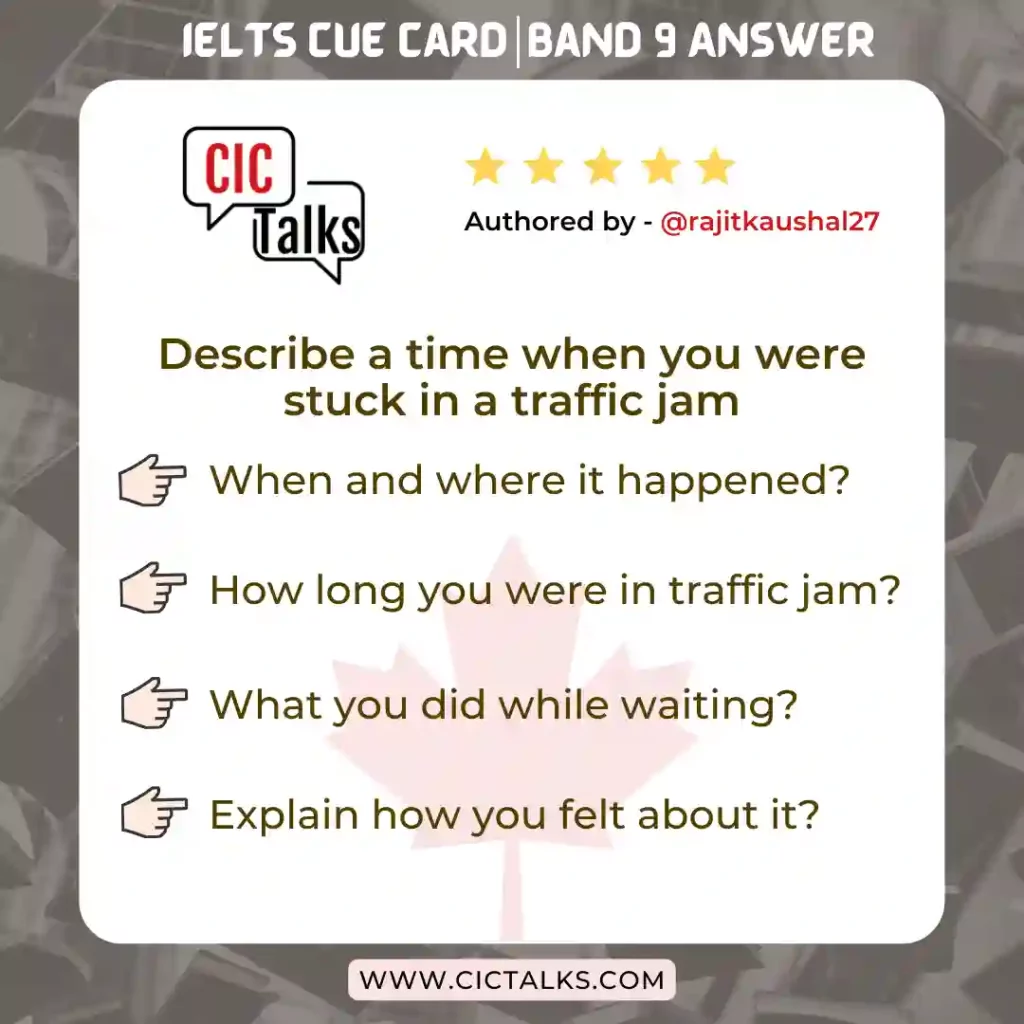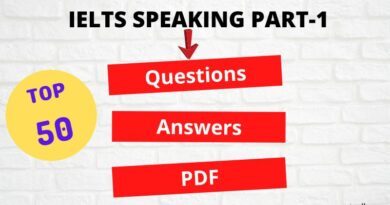[7+] Describe a time when you were stuck in a traffic jam IELTS Cue-Card
In Describe a time when you were stuck in a traffic jam Cue Card, you should say:
- When and where did it happen?
- How long have you been in a traffic jam?
- What you did do while waiting?
- Explain how you felt when you were in that traffic jam?

Here are the band 7+ sample answers to Describe a time when you were stuck in a traffic jam IELTS Speaking Cue Card:
Sample Answer 1
Introducing a time when you were stuck in a traffic jam
- Sitting through traffic is among the least pleasant things we do.
- Personally, I don’t get affected by small traffic jams. I am absolutely calm while driving and will not honk even vehicle ahead of me doesn’t move when the signal turns green. I will not change lanes, and never get antsy.
- But today, I would like to explain a time when I was stuck in a long traffic jam while the wait was frustrating.
When and where did it happen?
- Last weekend, I was travelling along with my brother from Delhi to Chandigarh for his regular health check-up.
- We thought the rush would not be as brutal as Delhi so we planned to move only a few hours in advance. It was quite smooth and we were enjoying ourselves.
- But as we reached Zirakpur, an 11 km long traffic jam turned everything horrible.
- We were told by the traffic police that there was construction going on so we have to brace ourselves for a bit more time in the car.
How long have you been in a traffic jam?
- We had been in the traffic jam for about 5 hours in total.
- While the distance is a few miles, it took us 3 hrs to just travel from Zirakpur to Chandigarh.
- The most upsetting part was that the people were honking like crazy.
- In a city like Delhi even in the peak rush hours, it would take a max of 30 minutes – to – 1 hour.
What you did do while waiting?
- I actually feel like following, above all hustle-bustle. I use the time to listen to audio podcasts.
- We watched cars slowly & gradually moving inch by inch, and their alarms blaring.
- My brother went out to see if there was another way out of the traffic. But all efforts were in vain.
- Then, after a while, I called my mother to inform her of the situation and told her not to worry about.
Explain how you felt when you were in that traffic jam?
- As far as my feelings are concerned, I was frustrated. I was regretting why would have chosen Saturday to come?
- I felt like bombing every car in the way (like in the video game GTA San Andreas).
- Somehow, my brother told me there is no point fretting and getting riled up about the jam. Which was true as we couldn’t do anything about it.
Concluding the Cue Card
And finally, after a frustrating 5 hours wait, we reached the clinic and hoped not to face traffic on our way back. I think God may have heard us. The traffic was minimal during the night and we had a quick passage to get out of Zirakpur.
Sample Answer 2
I live in a village, so there isn’t much traffic on the road most of the time. However, the only time we experience traffic congestion is when there is a cultural festival or a political gathering. And because these are usually mentioned in advance, I rarely get trapped in traffic.
However, I had gone to Nabha last week to buy several dresses for my brother’s wedding. There was no such traffic when we arrived. However, on the way back, the highway was closed due to a union strike at Preet Tractors, and the Police had barricaded the road. This principal route increasingly became congested. Furthermore, the road was narrow, which exacerbated the traffic problem.
The cops attempted but failed to disperse the crowd. We had been stalled in traffic for at least 4 to 5 hours. We initially believed that things were under control and that the embargo would be lifted. Instead, after only a few hundred metres in 30 minutes, my older brother got out of the car to assess the situation.
We couldn’t really back up because it was that crowded. So we passed the time by listening to music. To be honest, I think it’s a total government failure because the unions announced the road blockade a week ahead. The government was sound asleep.
Anyway, the day I was trapped in traffic ended on a positive note when we arrived home and had dinner. My mother prepared my bed, which helped me unwind.
Follow-ups
Following are the probable Describe a time when you were stuck in a traffic jam follow up questions that may be asked by the examiner in Speaking Part-3 of the test:
1. Are traffic jams common in Indian cities?
Yes, traffic jams are quite frequent in India. In fact, Mumbai shares second place with Bogota and Manila, all-seeing congestion levels of more than 50%. Though the pandemic did temporarily ease the gridlock in 2020, the city roads are getting choked up once again.
or
Yes, India has a large population, and traffic congestion is typical, particularly in major cities such as Delhi, Bombay, Chennai, and Kolkata. Furthermore, there is a negative culture in India of parking cars on the roadways, which lowers available parking space and causes traffic bottlenecks.
2. Why are cities today facing serious traffic issues?
Most big cities in the world today are facing serious traffic issues because of rapid growth in private vehicle ownership surpassing the population growth rate. On the one side this can be seen as economic development, while on the other side, more vehicles on the road put immense pressure on city infrastructure.
or
I think the main reason for the serious traffic issues is increasing urbanisation. More and more people are moving to cities for the better quality of life but this leads to more cars than roads can handle. Moreover, some older cities have narrow roads as they were not designed keeping today’s use of cars in minds. These narrow roads restrict traffic flow and lead to jams.
3. What can be done to improve traffic conditions in cities?
There are some fundamental steps which we all should take towards tackling traffic congestion in Indian cities:
- Carpooling is a very good option to reduce our contribution to road traffic.
- Use of Public transport is way cheaper and less stressful option to ease traffic congestion.
- Stricter implementation of some of the existing traffic rules can greatly help in improving traffic conditions.
or
While it is practically difficult to totally eradicate traffic congestion, there are numerous strategies to reduce its impact on our everyday life. To begin, I believe the government should encourage people to use public transit by making it more pleasant and speedier. For example, since the launch of the Kolkata Metro, traffic conditions in the city have significantly improved. In addition, roadways should be enlarged wherever possible to accommodate additional cars.
4. Can developing public transport help resolve traffic issues in cities?
More use of public transport means fewer vehicles on the road. That’s the reason why developing public commutes largely help resolve the traffic woes. Public transportation can decrease the number of private vehicles to ease traffic congestion, provide a good impact on the environment, and enhance the cost-effectiveness, reliability, and accessibility of the road network.
or
I believe that if public transit is rapid and comfortable, it can help to alleviate traffic congestion. For a long time, Delhi had local trains, which were unpopular due to their slowness. The construction of the Delhi Metro, which is fairly rapid and comfortable, did, however, make a significant dent in traffic.
————
————
I hope it gives you some realistic idea on how to carry a conversation around Describe a time when you were stuck in a traffic jam IELTS Cue card topic. However, it is strongly advised not to reproduce the same answer during the exam, as it may be used by many of our readers on the site. You should rather reformulate and personalise your answer.
If you still have any doubts, post them in the comments.
ALL THE BEST !

![as happy as Larry – IELTS Speaking/Writing Vocabulary Word List [PDF]](https://cictalks.com/wp-content/uploads/2021/10/as-happy-as-Larry-–-IELTS-SpeakingWriting-Vocabulary-Word-List-PDF-390x205.png)

![Describe a bicycle/motorcycle/car trip you would like to go on [Cue Card]](https://cictalks.com/wp-content/uploads/2021/09/trip-you-like-to-go-cue-card-390x205.jpg)
